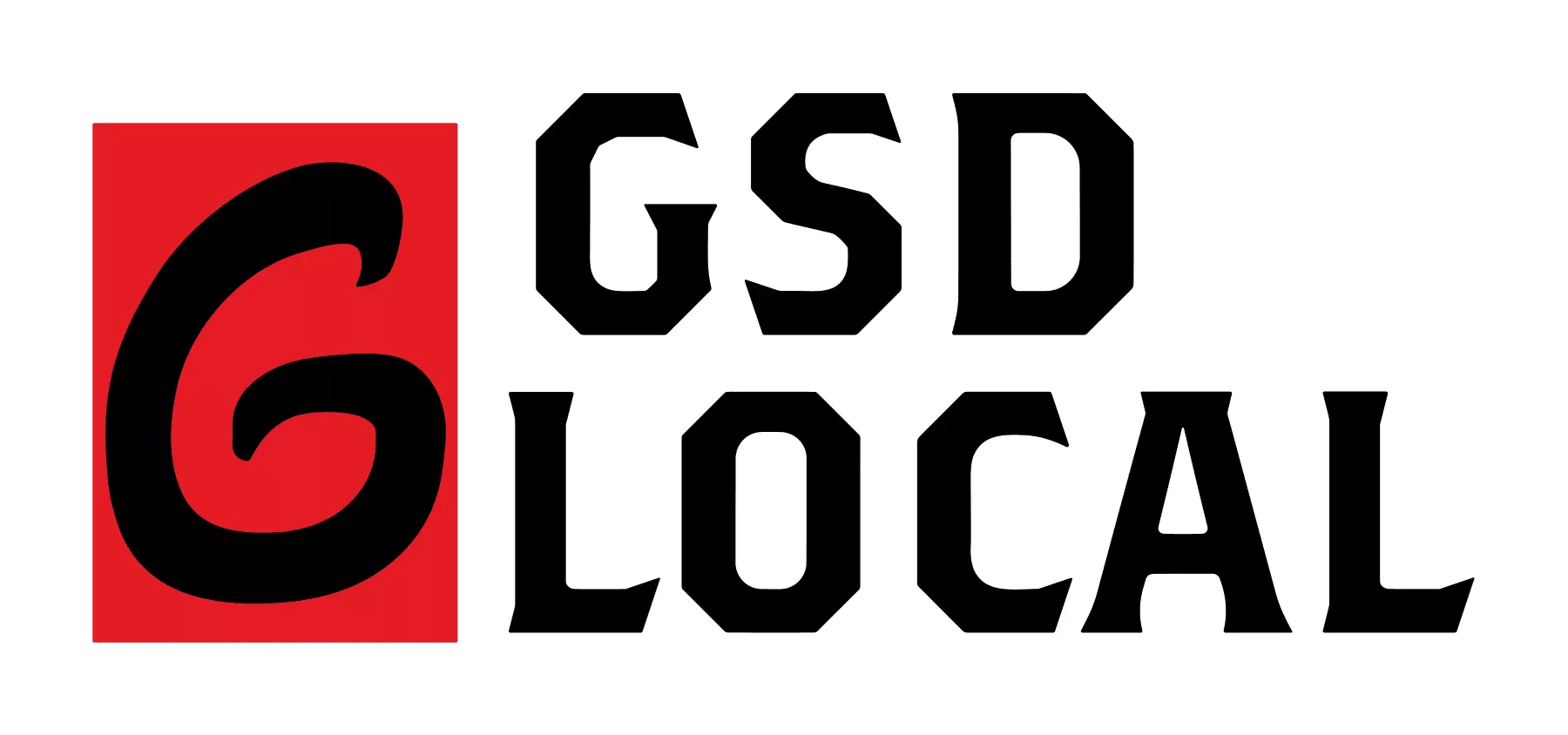THE AI VISIBILITY GAP...
Why ChatGPT Recommends Your Competitor (And Not You)
From Invisible Attorney to AI's First Choice in 90 Days
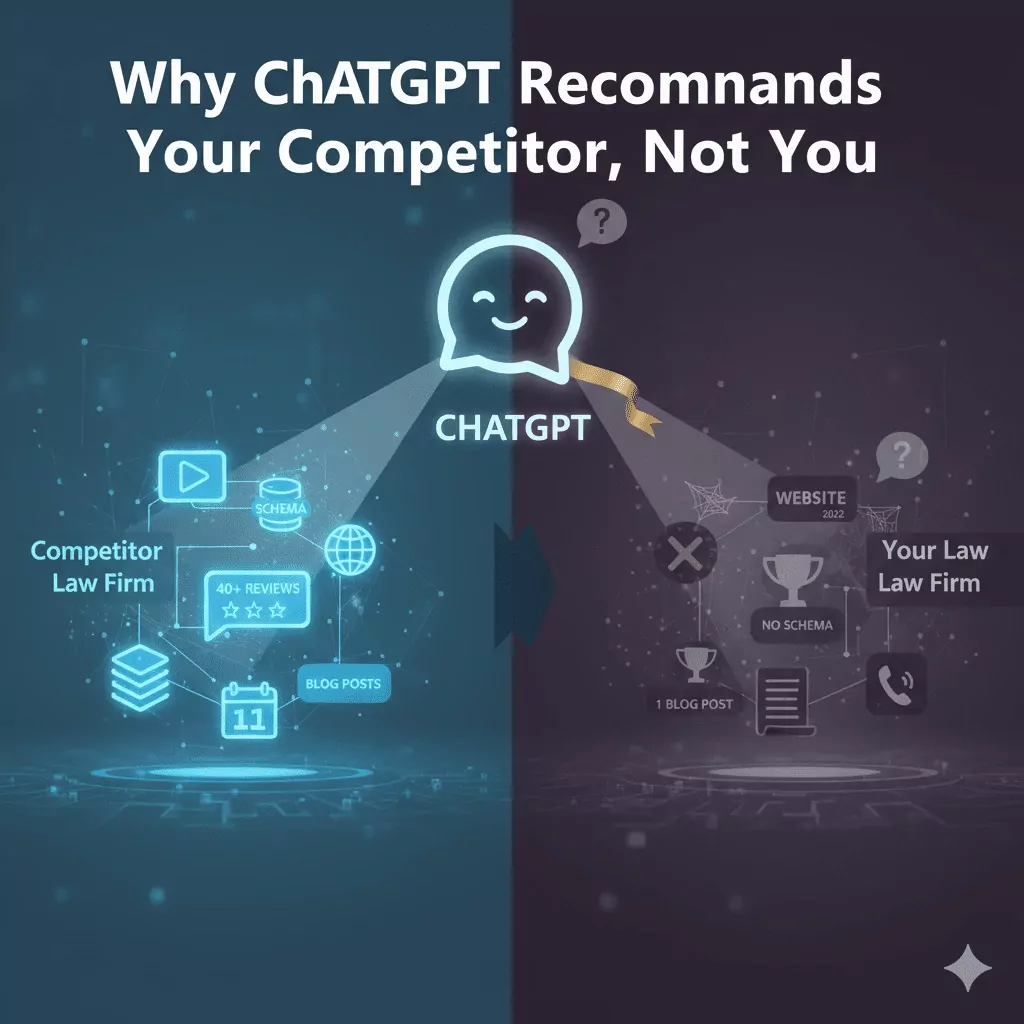
You're good at what you do.
Maybe great.
Years of experience. Solid track record. Happy clients.
But when someone asks ChatGPT "Who's the best estate planning attorney near me?" - your name doesn't come up.
Your competitor does.
The one who's been practicing half as long. The one whose website isn't as polished. The one who you KNOW isn't as skilled as you are.
But they're getting the calls.
And you're wondering what the hell is happening.
Welcome to 2025. Where being the best doesn't mean being chosen.
Being visible to AI does.
The Brutal Truth About AI Search
Here's what's changed.
Google used to show you 10 blue links. You could fight for position #1 through SEO tricks, keyword stuffing, and backlink schemes.
ChatGPT doesn't do that.
Claude doesn't do that.
Perplexity doesn't do that.
When someone asks an AI "Who should I hire?" - the AI gives ONE name. Maybe two.
That's it.
No page two. No scrolling through options. No comparing 47 different law firms.
One recommendation. One choice. One winner.
If you're not that name, you don't exist.
And here's the kicker: AI doesn't care about your fancy website, your years of experience, or your bar association awards.
AI cares about trust signals.
The digital breadcrumbs you leave across the internet that prove - beyond doubt - that you're credible, active, and authoritative.
Your competitor figured this out.
You didn't.
That's why they win.
What AI Actually Looks for (It's Not What You Think)
Let me break down exactly how AI systems decide who to recommend.
It's not random. It's not biased. It's just math.
But it's math based on trust signals you might not even know exist.
Signal #1: Consistent Online Presence
AI systems scan the web looking for patterns.
They ask: "Does this person show up regularly?"
If you posted twice on LinkedIn in 2023 and haven't touched your website since 2022, AI sees you as dormant. Irrelevant. Possibly retired.
Your competitor? They post every week. Sometimes every day.
Short videos. Quick tips. Client questions answered.
AI sees activity. Engagement. Currency.
Consistent presence = credible authority. (authority-driven marketing)
It's that simple.
Signal #2: Structured Data (Schema Markup)
This one's technical, but stay with me.
Your website speaks English. HTML. Text that humans read.
AI speaks data.
Schema markup is how you translate your website into a language AI understands.
It tells AI:
Your name
Your practice areas
Your location
Your credentials
Your reviews
Without schema, your website is just noise. Words on a page that AI can't process cleanly.
Your competitor added schema. Now AI knows EXACTLY who they are and what they do.
You're invisible because you're not speaking AI's language.
Signal #3: Review Volume and Recency
AI doesn't just count stars. It counts reviews. And it checks dates.
Five 5-star reviews from 2019? Nice. But old.
Forty-two 5-star reviews with the latest one from last week? That's gold.
AI sees current client satisfaction. Active practice. Real people vouching for you RIGHT NOW.
Your competitor has been systematically collecting reviews. Every closed case. Every satisfied client.
You? Maybe you have a few. But not enough. And not recent.
Review recency = active trustworthiness.
Signal #4: Content Depth and Relevance
AI scans for expertise demonstrated through content.
Blog posts. Videos. Articles. FAQs.
It's asking: "Does this person actually KNOW their field?"
One blog post from 2021 about estate planning basics doesn't cut it.
Your competitor has 50 articles answering every possible client question:
"What's the difference between a will and a trust?"
"How much does estate planning cost in Washington?"
"Can I disinherit a child?"
"What happens if I die without a will?"
AI sees depth. Authority. Someone who's thought through every angle.
Content volume = demonstrated expertise.
Signal #5: Third-Party Validation
AI looks for mentions of you on OTHER websites.
Legal directories. News articles. Industry publications. Guest posts.
It's checking: "Do other credible sources recognize this person?"
Your competitor gets quoted in local news. They write for legal blogs. They're listed in specialty directories.
You? Your name appears on your own website and nowhere else.
External validation = verified authority.
Signal #6: Video Content
Here's the surprise: AI LOVES video.
Why? Because video signals investment. Effort. Authenticity.
Anyone can type 500 words. Not everyone will get on camera and explain complex legal concepts clearly.
Your competitor has 100+ short videos on YouTube, LinkedIn, and Instagram.
Quick answers. Real face. Human connection.
AI interprets this as: "This person is confident enough to be visible. They're real. They're accessible."
Video presence = authentic credibility.
The Compound Effect of Trust Signals
Here's where it gets interesting.
One trust signal alone won't beat your competitor.
But when you stack them? They compound.
Your competitor has:
✅ Weekly content (consistent presence)
✅ Schema markup (AI-friendly website)
✅ 40+ recent reviews (active trust)
✅ 50+ helpful articles (demonstrated expertise)
✅ Media mentions (third-party validation)
✅ 100+ videos (authentic visibility)
You have:
❌ Outdated website
❌ No schema
❌ 5 old reviews
❌ One blog post
❌ Zero external mentions
❌ No video content
AI doesn't see you as 6X worse. It sees you as not credible enough to recommend.
That's the difference between being chosen and being invisible.
Why Traditional SEO Doesn't Save You Anymore
You might be thinking: "But I rank on Google for my keywords!"
Great.
But when someone asks ChatGPT instead of Googling, your SEO doesn't matter.
AI doesn't crawl websites the way Google does. It doesn't rank based on backlinks or domain authority.
AI recommends based on trust signals.
And those trust signals are different from traditional SEO signals.
That's why attorneys who dominated Google in 2020 are losing to newer competitors who understand AI visibility.
The game changed. Most lawyers didn't notice.
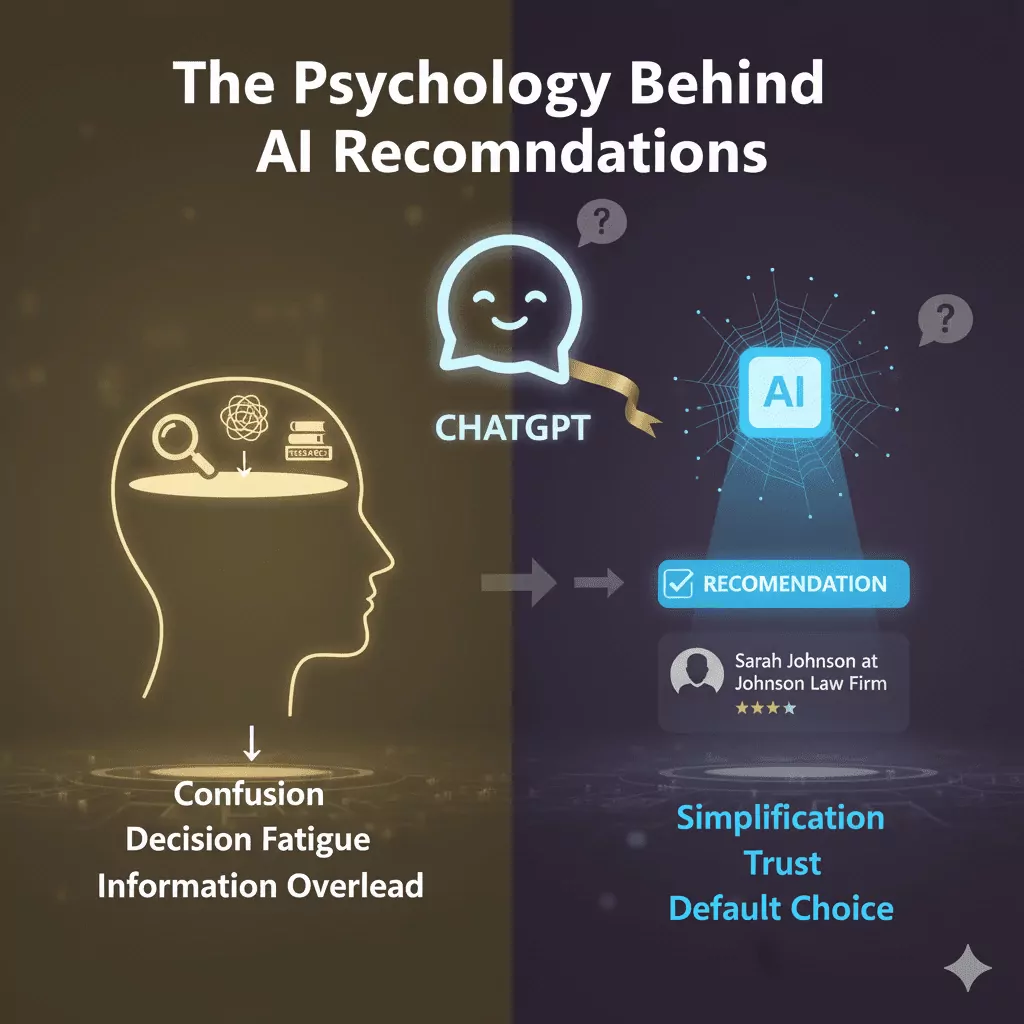
The Psychology Behind AI Recommendations
Here's what's happening in your potential client's mind.
They don't want to research 15 attorneys. They don't want to compare credentials. They don't want to read reviews for hours.
They want to be TOLD who to hire.
That's why they ask AI.
And when AI says: "I recommend Sarah Johnson at Johnson Law Firm" - the decision is made.
No comparison shopping. No second opinions. Just trust.
Because AI said so.
Your competitor gets that trust by default now.
You don't.
The Good News (And the Bad News)
Bad news first: You're behind.
Your competitor has been building these trust signals for months. Maybe years.
They have momentum. Authority. AI recognition.
Good news: It's not too late.
Trust signals compound. But they also BUILD.
Start today, and in 90 days you can be competitive. In 6 months you can dominate.
The question is: Will you?
Or will you keep wondering why your phone isn't ringing while your competitor is booked solid?
What You Need to Do (Starting Now)
This isn't complicated. But it IS consistent.
Here's your action plan:
Week 1: Foundation
Add schema markup to your website (hire a developer if needed)
Claim and optimize your Google Business Profile
Set up a system to request reviews from every satisfied client
Audit your online presence (Google yourself - what shows up?)
Week 2-4: Content
Write 3-5 blog posts answering common client questions
Record 5-10 short videos (60-90 seconds each)
Post consistently on LinkedIn (3X per week minimum)
Create an FAQ page on your website
Week 5-8: Amplification
Get listed in 5-10 legal directories
Reach out to local media for expert commentary
Guest post on industry blogs
Continue creating content consistently
Week 9-12: Optimization
Review what's working (which content gets engagement?)
Double down on successful formats
Continue building reviews
Maintain consistency
Do this for 90 days and you'll start seeing momentum.
Do this for 6 months and you'll start dominating.
Stop for even a week and you fall behind again.
The Real Reason Your Competitor Wins
It's not talent. It's not experience. It's not even better marketing.
It's consistency.
They show up every week. Every day. They create. They publish. They engage.
While you're "too busy" with client work, they're building the machine that BRINGS them client work.
While you're waiting for referrals, they're being recommended by AI to people who've never heard of them.
While you're hoping your reputation speaks for itself, they're MAKING their reputation speak through every digital channel available.
That's the difference.
The Choice You Have to Make
You can keep doing what you're doing.
Hope that word-of-mouth keeps working. Hope that your old SEO pays off. Hope that people still find you through traditional channels.
Or you can adapt.
You can start building the trust signals that AI looks for. You can create consistent content. You can become visible in the places people are actually searching.
Your competitor already made their choice.
That's why ChatGPT recommends them.
What will you choose?
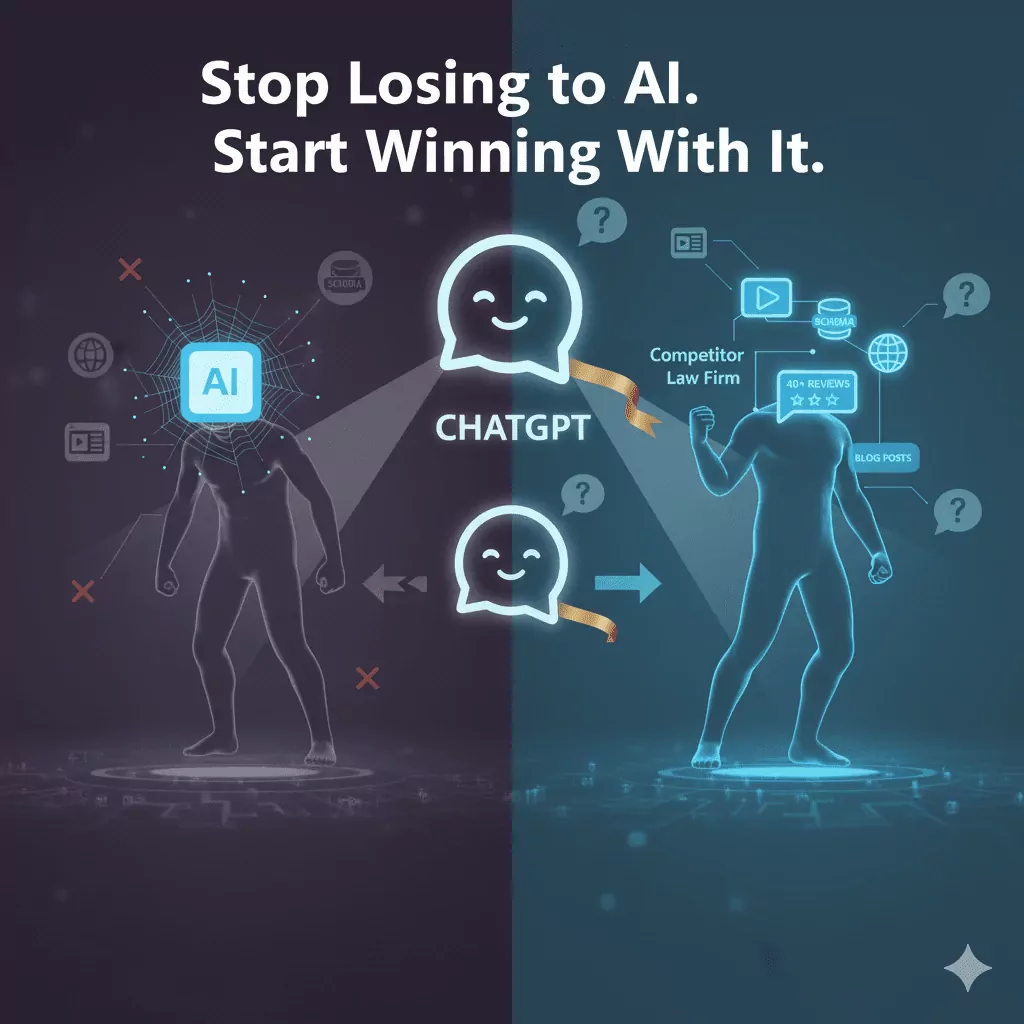
Stop Losing to AI. Start Winning With It.
Look, I get it.
You're a lawyer, not a content creator.
You didn't go to law school to become a video producer or a blogger.
You went to practice law. To help clients. To do the work you're passionate about.
But here's the reality: If people can't FIND you, they can't HIRE you.
And in 2025, "finding you" means being recommended by AI.
The attorneys who figured this out early? They're winning.
The ones who ignored it? They're wondering where their next client is coming from.
You get to decide which group you're in.
Ready to become the attorney AI recommends first?
📞 Schedule a free 15-minute Authority Audit and we'll show you exactly where your AI visibility gaps are - and how to fix them fast.
Because in 2025, invisible experts don't get clients.
Visible ones do. Contact us today!
Frequently Asked Questions
How does ChatGPT decide which lawyer to recommend?
ChatGPT and other AI systems analyze trust signals across the internet to determine credibility and authority. They look for consistent online activity, structured data (schema markup), review volume and recency, content depth, third-party validation, and video presence. The attorneys with the strongest combination of these signals get recommended. It's not random - it's based on verifiable patterns of expertise and trustworthiness that AI can identify and measure.
What trust signals do AI systems look for in legal professionals?
AI systems prioritize six key trust signals: (1) Consistent online presence through regular content posting, (2) Schema markup that translates your website into AI-readable data, (3) Recent and numerous client reviews, (4) Deep content demonstrating expertise in your practice areas, (5) Third-party validation through mentions on credible external sites, and (6) Video content showing authentic expertise. The more signals you have, the more confident AI becomes in recommending you.
Can small law firms compete with large firms in AI search?
Absolutely. AI search actually levels the playing field in ways traditional marketing never could. Large firms have bigger budgets for ads, but AI doesn't care about ad spend - it cares about trust signals. A solo attorney posting helpful videos consistently can outrank a 50-lawyer firm with a static website. Small firms are often MORE agile, more personal, and more authentic in their content - all things AI recognizes and values. Size matters less than consistency and authenticity.
How long does it take to start appearing in AI recommendations?
Most attorneys who implement a comprehensive AI visibility strategy see initial results within 60-90 days. However, timing depends on consistency and competition. If you're posting helpful content weekly, building reviews, and have proper schema markup, AI systems will start recognizing your authority within 2-3 months. Full market dominance typically takes 6-12 months of sustained effort. The key is that every day you delay, your competitors who are already building trust signals get further ahead.
Do I need to be on every social media platform to rank in AI search?
No. AI visibility isn't about being everywhere - it's about being consistent where it matters most. For most attorneys, focusing on three platforms works best: (1) Your website with proper schema markup and helpful content, (2) LinkedIn for professional networking and thought leadership, and (3) YouTube or Instagram for short-form educational videos. Pick platforms where your ideal clients actually spend time, then commit to showing up consistently. Three platforms done well beats seven platforms done poorly.
What's the fastest way for busy attorneys to build consistent AI visibility without spending hours on content creation?
This is where systems make all the difference. The most efficient approach is to capture your expertise once and multiply it across platforms. That's exactly what ClipCred does - we interview you about your practice in one focused session, then transform that conversation into 30 days of daily authority content: short videos, social posts, and AI-optimized assets. You spend one hour, we handle the rest. You stay focused on clients while your visibility builds automatically. It's how busy attorneys maintain consistent presence without content creation becoming a second full-time job.
Is AI search optimization different from traditional SEO?
Yes, in fundamental ways. Traditional SEO focused on keywords, backlinks, and domain authority - signals Google's algorithm prioritized. AI search focuses on trust signals, structured data, and demonstrated expertise through content. You can rank well on Google but be invisible to AI if you don't have schema markup, consistent content, and recent reviews. The good news? Many AI optimization strategies (like creating helpful content and building reviews) also improve traditional SEO. But AI requires specific technical elements like JSON-LD schema that many SEO-optimized sites still lack.
